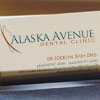If you’ve got a cavity, having a dental filling placed can help to relieve discomfort and restore the strength of your tooth. Our Fort St. John dentists offer some advice about what you should and should not do after a filling.
Do be careful about eating after a dental filling.
Depending on the type of filling that was placed, you may want to be cautious about what you eat immediately following the filling procedure. Because composite white fillings harden instantly under the blue light your dentist uses, you can eat and drink immediately following the procedure.
Some options for good foods to eat following a tooth filling include soup, scrambled eggs and crackers. Look for food that requires minimal chewing.
On the other hand, if there is pain and swelling, wait until it decreases before eating.
Metal dental fillings take a bit of time to harden, so most dentists will recommend waiting at least 24 hours after receiving the dental filling to eat any solid foods.
To avoid biting your lips, cheek, or tongue, you will likely want to wait until the local anesthetic wears off before attempting to eat. Ask your dentist for advice about when is the best time to eat after your filling.
Don't eat sticky, hard or chewy foods for up to two weeks.
You may want to refrain from hot or cold drinks and foods for a few days following a dental filling. Sticky, hard or chewy foods are also a no-no - for up to two weeks. Anything that will require you to take hard bites and chew a lot - such as meat - is probably out.
You’ll also want to avoid highly acidic foods to prevent infection.
Do take over-the-counter painkillers if you notice pain, discomfort or tooth sensitivity after a filling.
You may notice some mild to moderate discomfort and pain following the filling. The majority of the time, you should notice that pain and swelling decrease within 12 hours and you can eat whatever you want without experiencing tooth sensitivity, or irritation around the area.
Take over-the-counter painkillers with ibuprofen or acetaminophen to alleviate any physical pain or discomfort after a dental filling.
In the event, pain, sensitivity or discomfort do not disappear after 24 hours, contact your dentist to schedule an appointment to check on your filling, to ensure that infection is not developing.
Don't hesitate to brush your teeth or floss after a filling.
Did you know that you don’t have to wait to brush your teeth or floss after a dental filling? As long as you brush gently and floss carefully around the tooth, you should be able to keep the area clean as usual.
Do contact your dentist if you experience a persistent toothache
Though it's true that you may feel some mild pain or discomfort, a persistent sharp or throbbing toothache can indicate that the decay has reached your tooth's pulp. You may need a root canal. Contact your dentist, who can address it for you promptly.

